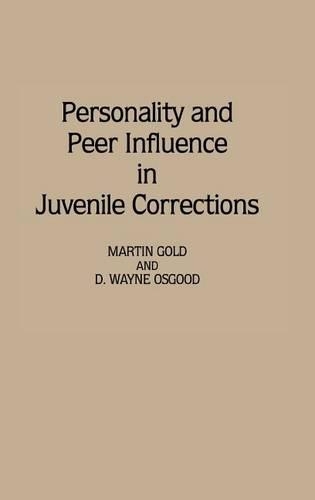
Personality and Peer Influence in Juvenile Corrections
(Hardback)
Publishing Details
Personality and Peer Influence in Juvenile Corrections
By (Author) Martin Gold
By (author) D. Wayne Osgood
Bloomsbury Publishing PLC
Praeger Publishers Inc
17th September 1992
United States
Classifications
Tertiary Education
Non Fiction
Penology and punishment
Social, group or collective psychology
Social research and statistics
364.6
Physical Properties
Hardback
256
Description
This work aims to be an innovative study of 300 delinquent boys in a medium security institution and after their release. This longitudinal field experiment shows how peers affect the rehabilition of different group members, how staff use those influences to lead to prosocial change after release from the institution, and how different behaviour, values and feelings improved. This research has broad implications for use in graduate courses in sociology, criminology and penology, social and personality psychology, and group dynamics. The book should be equally useful to administrators and policymakers dealing with delinquents and individuals with behaviour problems. The field experiment was devised with both practical and theoretical purposes in mind, to develop corrective programs for delinquent youth and to test social science hypotheses in the context of a longitudinal experimental research design. The study presents a typology of delinquent boys that guides differential treatment, focuses on peer group and staff influences, and identifies factors in residential treatment and in the open community that facilitate prosocial re-entry. The findings test hypotheses about group and staff impact on anti-social behaviour within the institution and after release.
Reviews
Their research explores the impact of boys' characteristics and background on institutional adjustment; on the program and its effect on behavior, attitudes, and values Good bibliography. Advanced undergraduate; graduate; faculty; community college; professional.-Choice
This is a scientifically conducted and fairly reported study.-Criminal Justice Review
"This is a scientifically conducted and fairly reported study."-Criminal Justice Review
"Their research explores the impact of boys' characteristics and background on institutional adjustment; on the program and its effect on behavior, attitudes, and values Good bibliography. Advanced undergraduate; graduate; faculty; community college; professional."-Choice
Author Bio
MARTIN GOLD is a Research Scientist at the Institute for Social Research and Professor of Psychology at the University of Michigan. He has written at length in the field of social psychology and delinquency, and his books include Delinquent Behavior in an American City (1970) and Expelled to a Friendlier Place: Study of Effective Alternative Schools (1984). D. WAYNE OSGOOD is Associate Professor of Sociology and Director of the Bureau of Social Research at the University of Nebraska, Lincoln. He is the author of Cognitive Structure: Theory and Measurement of Individual Differences (1979). He has also written at some length on juvenile delinquency and adolescent behavior problems.
